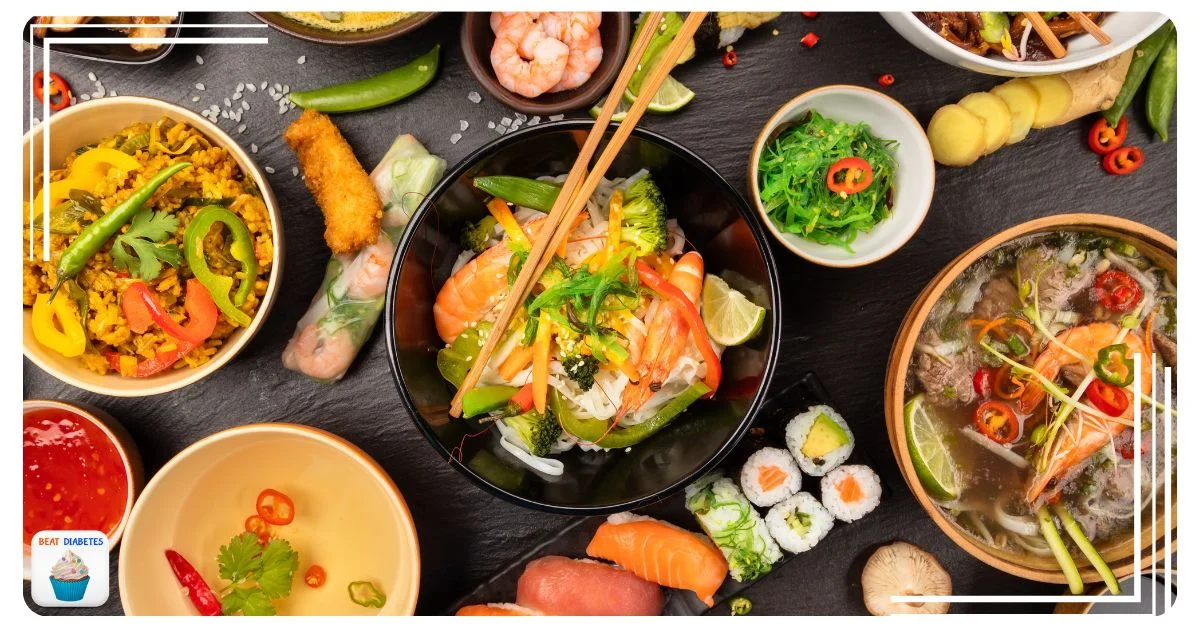Last Updated on June 12, 2023 by Dr Sharon Baisil MD
Diabetes is a serious condition that requires careful management of diet and lifestyle. Chinese cuisine offers a wide variety of options for people with diabetes. This article will explore which dishes are suitable for individuals with diabetes, as well as how to manage sauce options in order to keep blood glucose levels under control.
Can I enjoy Chinese cuisine while managing diabetes?
Yes, it is possible for diabetics to enjoy Chinese cuisine through a mindful selection of food items and dietary practices.
To maximize the health benefits, diabetics should focus on low-glycemic index foods, such as brown rice or cauliflower rice, lean proteins like skinless chicken or tofu, and steamed dishes.
It is also important to be aware of portion control when consuming carbohydrates and balance meals with protein and vegetables.
Additionally, it is best to avoid sugary sauces, pork, duck, or beef dishes as these can increase blood glucose levels.
With the right knowledge and preparation techniques, individuals with diabetes can still enjoy a variety of delicious Chinese cuisine options.
Which low-carb Chinese dishes are suitable for people with diabetes?
For individuals with diabetes, low-carb Chinese cuisine can provide a nutritionally balanced meal that is both flavorful and satisfying. Those looking to enjoy Chinese dishes while managing their diabetes should consider the following options:
- Steamed Fish with Ginger and Scallions
- Egg Foo Young
- Moo Shu Chicken or Pork
- Stir-Fried Chicken with Vegetables
- Shrimp and Vegetable Stir-Fry
- Beef and Broccoli
- Moo Goo Gai Pan
- Buddha’s Delight (Jai)
- Steamed ginger soy fish
These dishes are all low in carbohydrates and rich in lean proteins such as skinless chicken, shrimp, tofu, or fish. Additionally, they include plenty of non-starchy vegetables like bok choy, Chinese broccoli, watercress, and mushrooms which are beneficial for those counting carbohydrates.
When preparing these meals at home using stir-frying techniques it is important to opt for minimal oil and avoid adding any sugary sauces or cornstarch. This way you can enjoy a delicious meal while staying mindful of your diabetes management goals.
Are there diabetes-friendly options among traditional Chinese appetizers?
Traditional appetizers can provide a delicious, diabetes-friendly meal option for those looking to enjoy Chinese cuisine.
Bok choy, Chinese broccoli, and watercress are all excellent stir-fry choices as they are commonly eaten in Chinese cuisine.
Additionally, lean proteins such as chicken, seafood, lean steak, or tofu-based entrees make better options than dishes featuring pork, duck, or beef.
Steamed ginger soy fish is also a good alternative to fried options.
With some simple substitutions and mindful portion sizes, people with diabetes can safely enjoy traditional Chinese appetizers while controlling their blood sugar levels.
Can I include rice and noodles in my Chinese meals with diabetes?
Including rice and noodles in meals for people with diabetes can be a delicious and nutritious option, but it is important to be mindful of portion sizes and healthier alternatives. For instance, white rice can be replaced by brown rice or cauliflower rice which are better sources of fiber; plus, small portions of rice and noodles should always be paired with non-starchy vegetables for lower carbohydrate content.
Sushi rolls with lean protein substitutes are also excellent choices for blood sugar control.
Asian dishes like vermicelli with soy sauce, ginger, bok choy, soup-based dishes made from whole grains, and other low-carbohydrate options such as chicken, fish, or tofu are all great choices when creating Chinese meals with diabetes.
It is essential to remember that carbohydrate intake needs to be monitored closely when consuming these foods as they have high levels of carbohydrates which may cause an increase in blood glucose levels. Thus, including healthy ingredients into the dishes will help reduce these risks while still allowing individuals to enjoy their favorite Chinese meals. Making simple substitutions and being aware of portion sizes is key for people with diabetes who wish to enjoy Chinese food safely and deliciously.
How can I navigate the sauce options in Chinese cuisine while managing diabetes?
Navigating the sauce options in Chinese cuisine while managing diabetes can be a tricky task, as many popular dishes are coated in sugary sauces that may not fit into a diabetic diet. However, with careful consideration and some research, there are still plenty of delicious and safe soup options to explore.
- Egg Drop Soup
- Hot and Sour Soup
- Chicken and Vegetable Soup
- Seaweed Soup
- Winter Melon Soup
- Radish and Pork Soup
- Tomato and Beef Soup
With some research and creativity, it is possible to find Chinese cuisine that fits into a diabetic diet without sacrificing flavor or enjoyment.
What are some diabetes-friendly vegetable dishes in Chinese cuisine?
Transitioning from the previous subtopic of navigating the sauce options in Chinese cuisine while managing diabetes, this section will discuss some diabetes-friendly vegetable dishes in such cuisine.
Chinese culinary tradition offers a variety of flavorful and nutritious dishes that are suitable for people with diabetes. For example, stir-fried mixed vegetables are a great option as they combine various vegetables like broccoli, bok choy, bell peppers, carrots and mushrooms with minimal oil and light seasoning.
Additionally, steamed Chinese greens such as Chinese cabbage or bean sprouts are also excellent choices as they can be served with a light drizzle of soy sauce or garlic. Buddha’s Delight (Jai) is another vegetarian dish made with an assortment of vegetables such as snow peas, mushrooms, water chestnuts, and bamboo shoots which is both flavorful and healthy. Furthermore, Mapo Tofu is a popular Sichuan dish that can be supplemented with extra seasonal vegetables to enhance its nutritional value.
Bean-based dishes like tofu stir-fries or bean curd dishes should also be considered as they offer a good source of protein without being too high in carbohydrates.
Finally, garlic snow peas provide an easy yet delicious side dish that pairs well with other dishes in Chinese cuisine.
In summary, there are many diabetes-friendly vegetable dishes available in traditional Chinese cooking which provide tasty alternatives to those managing their blood sugar levels through diet control.
Are there specific Chinese soups that are suitable for people with diabetes?
Various soups found in Chinese cuisine can be modified to adhere to the dietary needs of people with diabetes. Examples include:
- Vegetable trio soup
- Veggie Thai curry soup
- Egg drop soup
- Hot and sour soup
- Chicken and vegetable soup
- Seaweed soup
- Winter melon soup
- Radish and pork soup
- Tomato and beef soup
These soups are low in calories and carbohydrates while providing essential vitamins and minerals. In addition to these soup-based dishes, there are other low-sodium options such as steamed fish or mushroom dishes that also provide healthy nutrients for those with diabetes.
Key Takeaways
- Low-glycemic index foods like brown rice, lean proteins, and steamed dishes are recommended for managing diabetes while enjoying Chinese cuisine.
- Non-starchy vegetables like bok choy, Chinese broccoli, watercress, and mushrooms are beneficial and should be paired with small portions of rice and noodles.
- Sugary sauces, pork, duck, or beef dishes should be avoided, and seafood dishes like steamed ginger soy fish and hot pot with low-sodium broths are good choices.
- Traditional Chinese appetizers with lean proteins and non-starchy vegetables, sushi rolls with lean protein substitutes and white rice alternatives like brown rice or cauliflower rice, and various soups modified to adhere to dietary needs are diabetes-friendly options.
Frequently Asked Questions
References
- https://pubmed.ncbi.nlm.nih.gov/30535795/
- https://pubmed.ncbi.nlm.nih.gov/24587528/
- https://pubmed.ncbi.nlm.nih.gov/11710364/
- https://pubmed.ncbi.nlm.nih.gov/31766681/
- https://pubmed.ncbi.nlm.nih.gov/20016014/
- Prevention
- Diabetes Self Management
- Everyday Health




